
Catch the Gang of Four postgrads this Wed!

Latest research and knowledge exchange news at Bournemouth University


Changes have been made to the NERC Research Grants & Fellowships Handbook in February 2018.
The important changes include:
For a clean copy of the NERC Grants Handbook 2018, please click here.
For a summary document outlining the above changes and an annotated NERC Grants Handbook, please contact Alice Brown, details can be found on the Funding Development Team page.
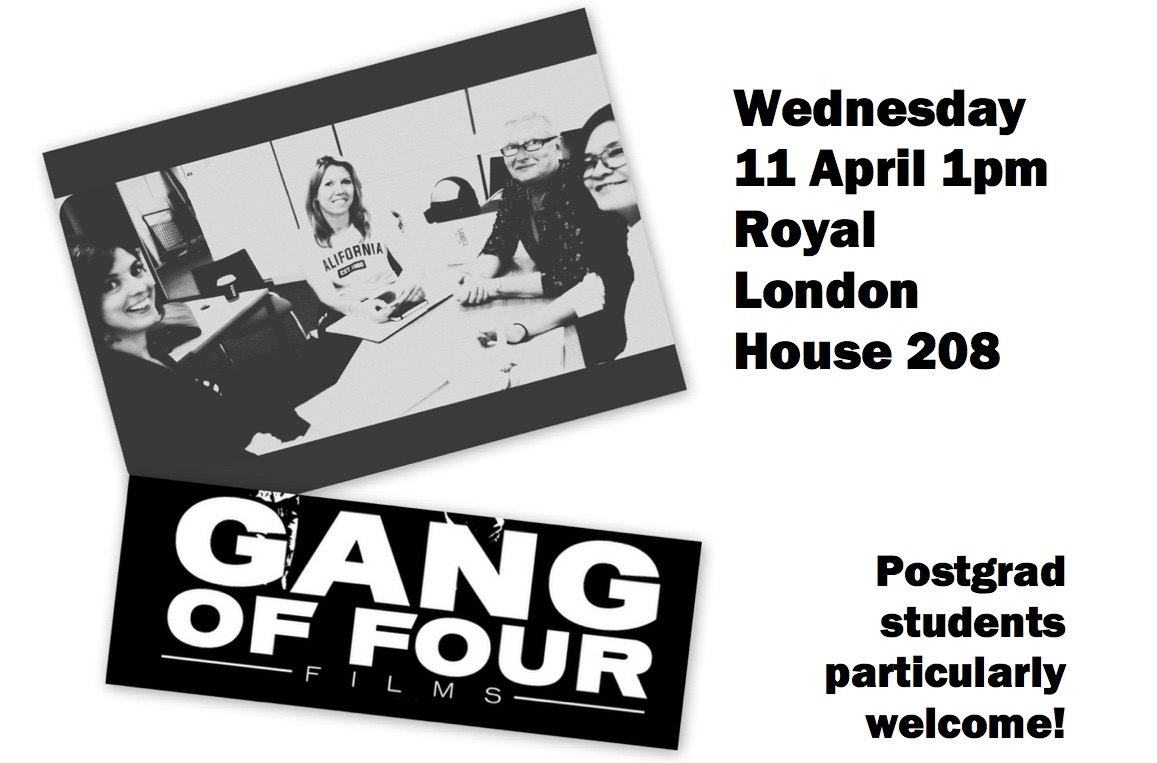
The result was an enhanced depth of understanding of specific interpretive research methodologies as well as an unexpected support mechanism.
The group’s primary function was to support development of its understanding of methodologies and methods, but an unexpected secondary function was the reduction of a sense of isolation.
United through the fundamental overarching field of narrative research, four doctoral candidates with distinct topic areas were able to collaborate. They not only enhanced their depth of understanding of specific interpretive research methodologies, but also provided support and encouragement to each other within the potentially isolating experience of postgraduate research study.

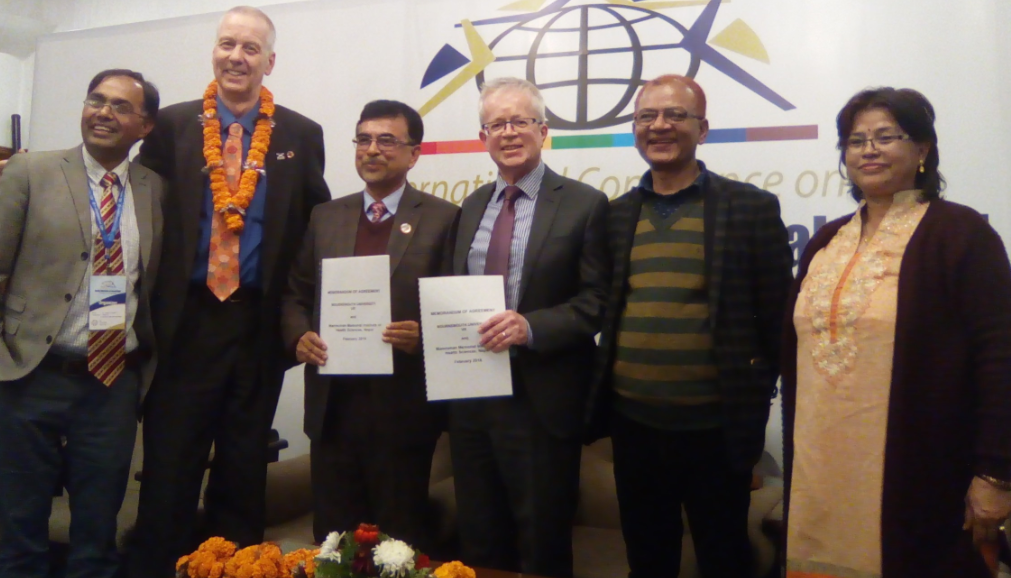 As part of the new plan BU2025, “we want to continue to develop our global partnerships and links with other institutions and organisations”. This is an admirable aim, and it is, of course, the best way forward for a truly global Higher Education Institution like Bournemouth University (BU). But to translate this general aim into a particular global partnership we need to consider the underlying processes of initiating and developing such partnerships. We published a paper [1] on the issues one needs to consider in developing a partnership, based on the example of BU’s partnership with Manmohan Memorial Institute of Health Sciences (MMIHS) in Nepal.
As part of the new plan BU2025, “we want to continue to develop our global partnerships and links with other institutions and organisations”. This is an admirable aim, and it is, of course, the best way forward for a truly global Higher Education Institution like Bournemouth University (BU). But to translate this general aim into a particular global partnership we need to consider the underlying processes of initiating and developing such partnerships. We published a paper [1] on the issues one needs to consider in developing a partnership, based on the example of BU’s partnership with Manmohan Memorial Institute of Health Sciences (MMIHS) in Nepal.
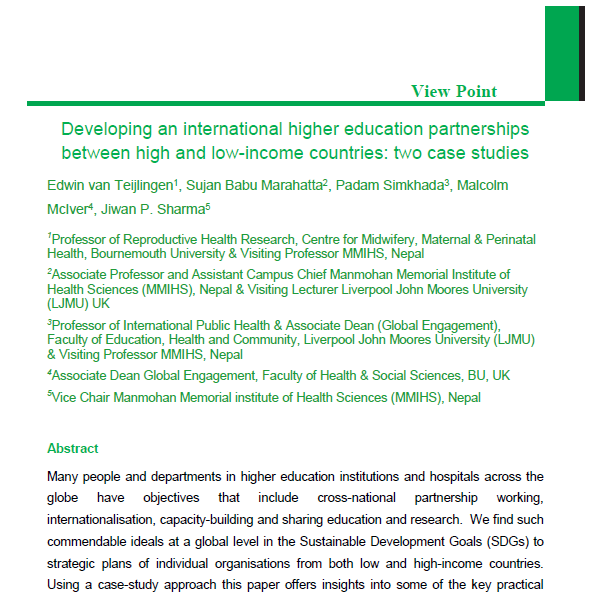
In late February this year MMIHS signed a Memorandum of Agreement (MoA) with BU at a ceremony in the Nepalese capital Kathmandu, where Prof. Stephen Tee represented BU. This MOA is an agreement between us that provides a basis on which the parties will consider potential future collaboration. The UoA formalises a long-standing collaboration between the two institutions, and indicates a desire to collaborate further in the future. MMIHS and BU academics have jointly applied for research grants, conducted collaborative research and published together and it is exactly this personal link between people that allows this, and many other, global partnerships to flourish.
Prof. Edwin van Teijlingen
Centre for Midwifery, Maternal & Perinatal Health
Reference:
 Congratulations to two Faculty of Health & Social Sciences PhD students, Preeti Mahato and Elizabeth Waikhaka, who co-authored a paper published in the WHO South-East Asia Journal of Public Health. Their paper is called ‘Social autopsy: a potential health-promotion tool for preventing maternal mortality in low-income countries’.[1] Co-authors include Dr. Puspa Pant from the Centre for Child and Adolescent Health, University of the West of England (Bristol) and Dr. Animesh Biswas based at the Reproductive & Child Health Department, Centre for Injury Prevention & Research, Bangladesh (CIPRB) in the capital of Bangladesh, Dhaka.
Congratulations to two Faculty of Health & Social Sciences PhD students, Preeti Mahato and Elizabeth Waikhaka, who co-authored a paper published in the WHO South-East Asia Journal of Public Health. Their paper is called ‘Social autopsy: a potential health-promotion tool for preventing maternal mortality in low-income countries’.[1] Co-authors include Dr. Puspa Pant from the Centre for Child and Adolescent Health, University of the West of England (Bristol) and Dr. Animesh Biswas based at the Reproductive & Child Health Department, Centre for Injury Prevention & Research, Bangladesh (CIPRB) in the capital of Bangladesh, Dhaka.
The authors argue that verbal autopsy is used to attribute a clinical cause to a maternal death. The aim of social autopsy is to determine the non-clinical contributing factors. A social autopsy of a maternal death is a group interaction with the family of the deceased woman and her wider local community, where facilitators explore the social causes of the death and identify improvements needed. Although still relatively new, the process has proved useful to capture data for policy-makers on the social determinants of maternal deaths. This article highlights the potential role of social autopsy in health promotion.
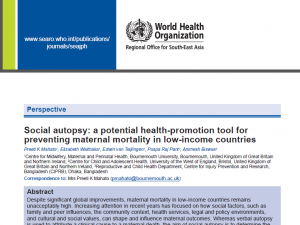
Reference:
The Creative Industries Sector Deal has been announced. You can read the document here.
The press release says:
After a consultation proposing changes to the UK Quality Code for HE, (you can read BU’s response here) the QAA have published the new, very short Code. There’s some commentary on Wonkhe here. It really is short – in a 7 page document there is only one real page of content – but there is more guidance to come.
To inform our BU response to the HE Review all staff and students are invited to consider the issues in this (anonymous) 5-minute survey. Please take a look at the survey questions as we’d like to hear from as many staff and students as possible. You don’t have to answer all the questions! The major review of HE will shape the HE system, including how universities are funded for years to come. The survey will be available to staff and students until Friday 20th April.
The Department for Education also published a research report by Youthsight on the influence of finance on higher education decision making
Amongst its findings:
And the government have published the outcomes of their 2014/15 student income and expenditure survey. There is a lot of data and there are lots of interesting charts, including figure 2.6 (the influence of financial support on my decisions), table 3.7 (what support English domiciled students received by mode of study), figure 4.3 (breakdown of total student expenditure (this one excludes the tuition fee but there is also a chart that includes it), figure 4.4 (total expenditure and housing costs).
The data from both these reports will be pored over to support responses to the HE review.
The Joint Committee on Human Rights has published its report into free speech in universities. The Committee has also published its own guidance for universities and students:
Charity Commission Response: Charity Commission responds to Joint Committee on Human Rights
The Committee don’t identify many actual cases of free speech having been prevented but note a “chilling effect” (it’s hard to prove a negative, of course). The report identifies factors that potentially limit free speech in universities:
Recommendations
Chair of the Committee, Harriet Harman MP, said:
Some particular points to note:
The Migration Advisory Committee (MAC) has published its interim update on the impact of EEA and non-EEA workers in UK labour market. This is the first MAC inquiry of two – the second one is the one about students, this was more general and about workers across all sectors.
The update sets out a summary of the views expressed by employers and of the regional issues raised. They add that “these themes seem the best way of summarising the views expressed to us but should not be taken to imply that the MAC endorses a sectoral and/or regional approach to post-Brexit migration policy.” The MAC has also published the responses to their call for evidence, broken down by sector.
The report includes the following findings:
This week is the launch of UKRI – it is worth looking at their objectives.
.The Council for Innovate UK has been announced. The members are:
The REF panels have also been announced – follow this link to see the lists.
Q Andrew Percy MP
To ask the Secretary of State for Education, whether his Department is taking steps to ensure that prospective undergraduates understand the potential effect of their choice of course on their prospects post-graduation.
Q Angela Rayner MP To ask the Secretary of State for Education, what estimate his Department has made of the value of plan 1 student loans that will not be repaid.
Q Angela Rayner MP: To ask the Secretary of State for Education, with reference to the written ministerial statement of 31 October 2017 on government asset sale, HCWS205, what methodology his Department used to decide which loans from the plan 1 loan book would be sold.
Q: Angela Rayner MP: To ask the Secretary of State for Education, with reference to the written statement of 6 December 2017 on Government Asset Sake, HCWS317, what assessment he has made of the net fiscal effect of the sale of the student loan book after accounting for reduced income arising from lost repayments.
To subscribe to the weekly policy update simply email policy@bournemouth.ac.uk
JANE FORSTER | SARAH CARTER
Policy Advisor Policy & Public Affairs Officer
Follow: @PolicyBU on Twitter | policy@bournemouth.ac.uk
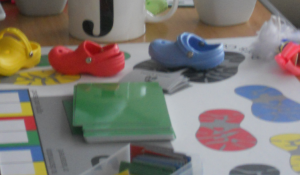 Today BMC Pregnancy & Childbirth published the latest paper by a PhD student at Bournemouth University. Our congratulations go to Alice Ladur in the Centre for Midwifery, Maternal & Perinatal Health (CMMPH), who published `Whose Shoes?’ Testing an educational board game with men of African descent living in the United Kingdom [1]. This paper is based on her PhD research and co-authored with her supervisors.
Today BMC Pregnancy & Childbirth published the latest paper by a PhD student at Bournemouth University. Our congratulations go to Alice Ladur in the Centre for Midwifery, Maternal & Perinatal Health (CMMPH), who published `Whose Shoes?’ Testing an educational board game with men of African descent living in the United Kingdom [1]. This paper is based on her PhD research and co-authored with her supervisors.
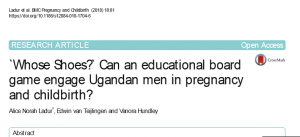 The paper addresses issues around men’s involvement in programmes or interventions aimed at the improvement of maternal health. One such innovative intervention is an educational board game which offers a unique approach to present health information where learning is reinforced through group discussions supporting peer-to-peer interactions. The authors would like to thank Gill Phillips for permission to use the Whose Shoes? board game and all participants for their participation in the PhD study.
The paper addresses issues around men’s involvement in programmes or interventions aimed at the improvement of maternal health. One such innovative intervention is an educational board game which offers a unique approach to present health information where learning is reinforced through group discussions supporting peer-to-peer interactions. The authors would like to thank Gill Phillips for permission to use the Whose Shoes? board game and all participants for their participation in the PhD study.
Alice PhD is focused on Uganda and this particular paper reports a qualitative study with men from Uganda who live in the UK on their views of an educational board game. This pilot study explored perceptions on whether a board game was relevant as a health promotional tool in maternal health prior to implementation in Uganda.

Reference:
Congratulations to Daisy Wiggins in the Centre for Midwifery, Maternal & Perinatal Health (CMMPH) on the publication of her paper ‘The effect of a birthplace decision support tool on women’s decision-making and information gathering behaviours during pregnancy: mybirthplace study protocol’. The paper is published in the Open Access journal Journal of Innovation in Health Informatics and can be accessed by clicking here! The paper is co-authored by CMMPH’s Prof. Vanora Hundley, Dr. Carol Wilkins, as well asProf. Carol Bond (University of Wolverhampton) and the Chief Executive of the Royal College of Midwives (RCM) Gill Walton.

Congratulations to all!
Prof. Edwin van Teijlingen
CMMPH
Reference:
Wiggins D, Hundley VA, Wilkins C, Bond C, Walton G. The effect of a birthplace decision support tool on women’s decision-making and information gathering behaviours during pregnancy: mybirthplace study protocol. J Innov Health Inform.2018;25(1):001–006.
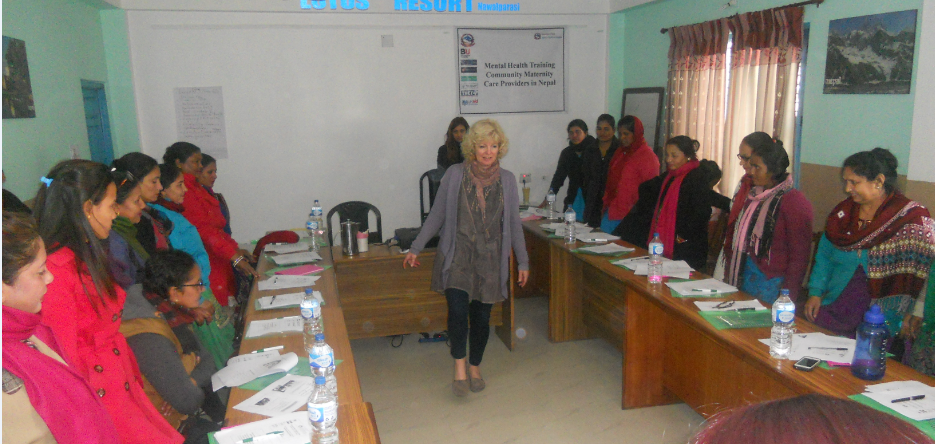 Congratulations to Mrs. Preeti Mahato on the acceptance of her paper ‘Qualitative evaluation of mental health training of Auxiliary Nurse Midwives in rural Nepal’ by Nurse Education Today, an academic journal published by Elsevier. Preeti is currently registered as PhD student in the Centre for Midwifery, Maternal & Perinatal Health (CMMPH). The paper is co-authored by CMMPH’s Catherine Angell and Edwin van Teijlingen as well as BU Visiting Faculty Padam Simkhada and Jillian Ireland. The paper is a result of the evaluation part of the ‘Mental Health Training for Community-based Maternity Providers in Nepal’ project and written on behalf of this THET team.
Congratulations to Mrs. Preeti Mahato on the acceptance of her paper ‘Qualitative evaluation of mental health training of Auxiliary Nurse Midwives in rural Nepal’ by Nurse Education Today, an academic journal published by Elsevier. Preeti is currently registered as PhD student in the Centre for Midwifery, Maternal & Perinatal Health (CMMPH). The paper is co-authored by CMMPH’s Catherine Angell and Edwin van Teijlingen as well as BU Visiting Faculty Padam Simkhada and Jillian Ireland. The paper is a result of the evaluation part of the ‘Mental Health Training for Community-based Maternity Providers in Nepal’ project and written on behalf of this THET team.

Our THET project in Nepal is a collaboration between the Centre for Midwifery, Maternal & Perinatal Health (CMMPH), Tribhuvan University (Nepal’s oldest university) and Liverpool John Moores University (LJMU). The project receives funding from DFID, and is managed through THET and supported locally in Nepal by a charity Green Tara Nepal.
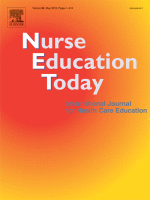
| THET team:
Edwin van Teijlingen, Padam Simkhada, Shyam K Maharjan Preeti Mahato, Bhimsen Devkota, Padmadharini Fanning, Jillian Ireland, Bibha Simkhada, Lokendra Sherchan, Ram Chandra Silwal, Shyam K Maharjan, Ram K Maharjan, Catherine Angell, Flora Douglas.
|
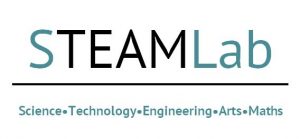 On Wednesday, 11th April 2018, BU’s Research and Knowledge Exchange Office will be facilitating a STEAMLab event on the Industrial Challenges.
On Wednesday, 11th April 2018, BU’s Research and Knowledge Exchange Office will be facilitating a STEAMLab event on the Industrial Challenges.
External Speakers include:
Jayne Codling of the Enterprise Europe Network
Dr. Herbert Daly, IBM Champion, University of Wolverhampton
with other speakers to be confirmed.
What will happen…?
We’re seeking to come up with novel research that could form part of the UK’s Industrial Strategy.
So, who should attend?
We want anyone who thinks they might have something to contribute, and who is available all day on Wednesday 11th April to come along. We will also be inviting relevant external attendees to contribute to the day. We welcome academics, NGO/business/government representatives who wish to contribute to having a positive impact through addressing Industrial Challenges.
What do I need to prepare in advance? What will the sandpit entail?
Absolutely nothing in advance. During the STEAMLab, you’ll be guided through a process which results in the development of research ideas. The process facilitates creativity, potentially leading to innovative and interdisciplinary research ideas. These ideas will be explored with other attendees, and further developed based on the feedback received.
What if I don’t have time to think about ideas in advance?
You don’t need to do this. Some inspiring speakers with a range of backgrounds will be coming along to give you ideas…
What about afterwards? Do I need to go away and do loads of work?
Well… that depends! The STEAMLab will result in some novel research ideas. Some of these may be progressed immediately; others might need more time to think about. You may find common ground with other attendees which you choose to take forward in other ways, such as writing a paper or applying for research funding. Support will be available to progress project ideas after the day.
What if my topic area is really specific, such as health?
Your contribution will be very welcome! One of the main benefits of a STEAMlab event is to bring together individuals with a range of backgrounds and specialisms who are able to see things just that bit differently to one another.
Definitely not! It is a facilitated session with the primary intention of developing innovative research ideas, which also enables the development of networks. It gives you the opportunity to explore research ideas which you may develop over time, together with the chance to find common ground with academics from across BU and beyond.
So, how do I book onto this event?
To take part in this exciting opportunity, all participants should complete Eventbrite form here and return this to RKEDevFramework@bournemouth.ac.uk by Friday, 6th April. Places are strictly limited and you will be be contacted to confirm a place place on the STEAMLab with arrangements nearer the time. The event will be held in Bournemouth at the Executive Business Centre.
By applying, you agree to attend for the full duration of the event on 11th April (c. 9:30 – 16:30). Spaces will be confirmed from 28/3/18.
If you have any queries prior to submitting your application, please contact Ehren Milner, RKEO Research Facilitator.
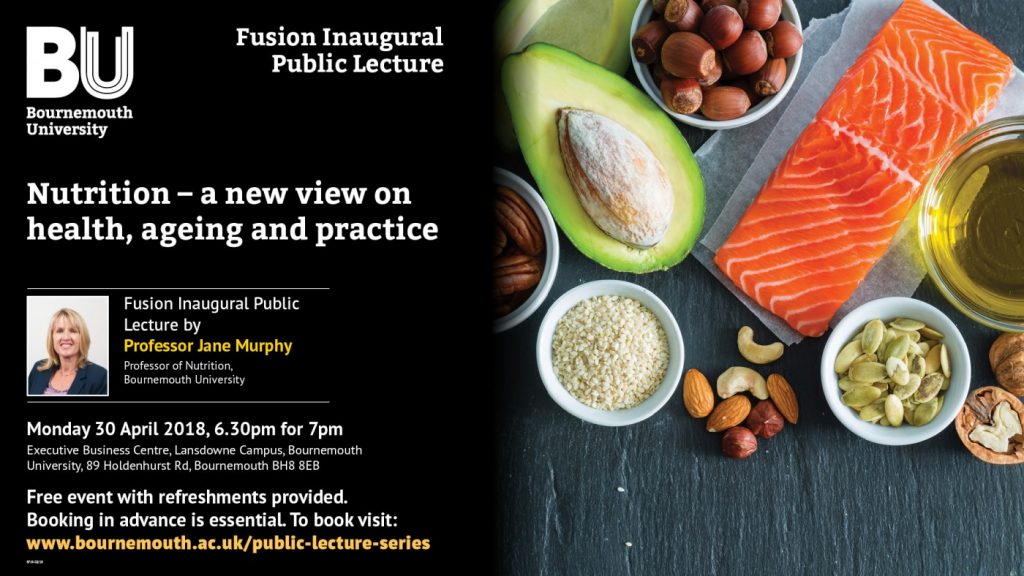
Our final inaugural lecture for this academic year will take place in the EBC on Monday 30 April and will be given by Professor Jane Murphy from the Faculty of Health & Social Sciences.
Good nutrition helps us to stay healthy and is a fundamental part of living a long, full and rewarding life. Food security, lifestyle and personal choices are some of the key factors that influence our ability to eat well and meet our nutritional needs. To help us navigate through these issues, we need the advice of qualified, experience and skilled nutrition professionals. But with some many conflicting messages about nutrition and health, how do we know what’s best and who to believe? Who should we trust to provide scientifically sound and effective nutritional advice?
Through her inaugural lecture, Professor Murphy will discuss the nutrition landscape in the UK and draw on her research journey to show recommendations around diet changes, particularly those linked to age-related conditions, have been underpinned by scientific evidence. Her lecture will discuss the challenges faced by nutritional professionals when translating knowledge into practice and the solutions she has used when developing new approaches to education and training in the wider health and social care workforce.
Jane Murphy is Professor of Nutrition, a Registered Nutritionist and Dietitian and co-leads the Ageing and Dementia Research Centre at Bournemouth University. Her research is committed to key nutritional problems faced by older people, especially the complex problems faced by people living with dementia and those living with and beyond cancer. At a national level, her ongoing work with Health Education England has provided evidence informed, high quality education and training to improve practice in dementia care across the health and social care workforce. Professor Murphy is committed to advancing the professional practice of nutritionists and is an elected Council member and Trustee for the UK Association for Nutrition and sits on a number of other national advisory boards including the Malnutrition Task Force with Age UK.
You can book your free tickets here.
For futher information on this event please contact research@bournemouth.ac.uk
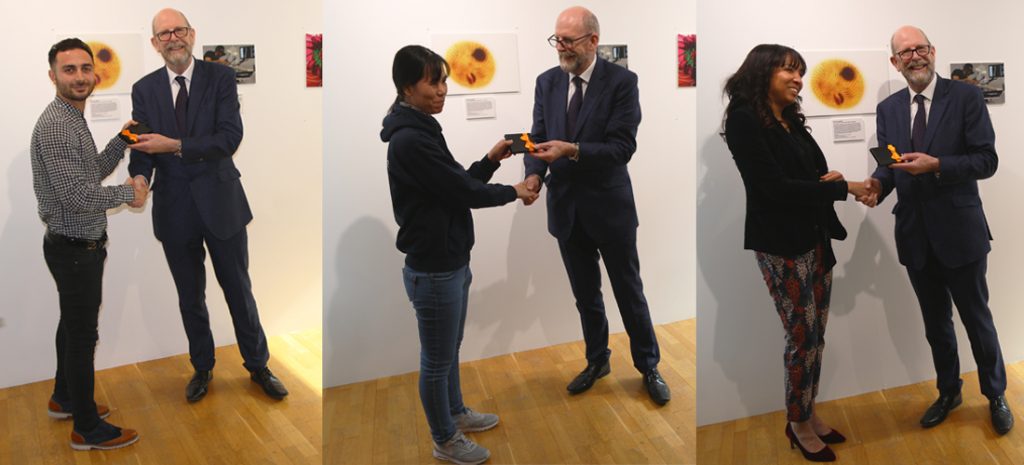
Sharing research through photography is a great opportunity to make often complex subjects much more accessible to all. This year over 1,500 people from all over the world voted in the competition, showing the power of images to engage and inspire. The research behind photos this year included areas such as archaeology, dementia and forensic science, among others.
The photography theme this year was people. The theme was open to interpretation, with photographers choosing to take an image of their research team, show people who might benefit or be affected by the research or even take a point of view shot. This year’s winners were announced in the Atrium Art Gallery on Tuesday 20 March, with prizes presented by Professor John Fletcher, Pro-Vice Chancellor of Research and Innovation. Details of the winners can be found below.
The photos are currently displayed in an art exhibition in the Atrium Art Gallery which demonstrates the creativity of our BU researchers and the diversity of research being undertaken. It’s a really enjoyable way to find out about research in areas within and outside your discipline or interests, and value the work and efforts. Do drop in and see the images, if you have a few minutes to spare!
The winners of the 2018 Research Photography Competition are:
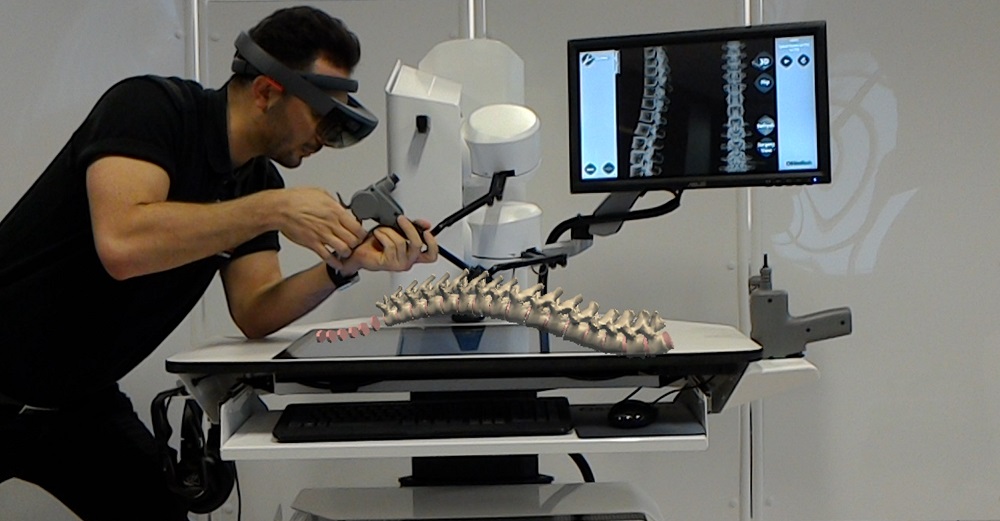
By Shayan Bahadori (Orthopaedic Project Manager) and Mara Catalina Aguilera Canon (Postgraduate Researcher, Faculty of Media and Communication).
In recent years we have seen a decline in theatre operating training time for junior surgeons. Simulators have subsequently been increasingly integrated as training, selection and evaluation tools. To fully formally integrate simulation into orthopaedic training we require evidence that the simulators are valid representations of the operations they seek to replicate. This is one the current research focus at Orthopaedic Research Institute (ORI) and we pursue to validate and develop virtual reality orthopaedic simulators so that they may be adopted into mainstream clinical practice.

By Hai Luu (Postgraduate student, Faculty of Science and Technology).
Ciliates protozoa are a distinct group of unicellular organisms. They are abundant phagotrophic micro-organisms in soil, playing important role in food webs by controlling the abundance of smaller microbes and recycling organic matter. Ciliates are characterised by some specific traits. Firstly, ciliates are dikaryotic organisms due to having two different cell nuclei; one is responsible for reproduction; the other one carries out cell functions. Secondly, they use cilia for locomotion and feeding. Interestingly, ciliates can reproduce asexually and sexually. From an ecological and functional point of view, ciliates can be used as bioindicators of soil quality – and this is the aim of our research. We are investigating the species richness and abundance of ciliated protozoa in natural and agricultural soils in order to assess their potential as bioindicators of soil quality. Soil quality plays an important role in agricultural production in terms of both quantity and quality, this links closely to quality of human life. This image shows Colpoda cucullus, a terrestrial ciliate commonly found in soils around the world, which was taken as a point of view shot through a microscope.
Research group: Hai Luu, Professor Genoveva Esteban, and Dr Iain Green (Senior Lecturer in Biological Science). Department of Life and Environmental Sciences, Faculty of Science and Technology.

By Dr Nicole Ferdinand (Senior Lecturer in Events Management) and her MSc Events Management student researchers: Diane Nthurima (pictured on the left), Cindy Chen (pictured on the right), Rui Bao, Yi-Hsin Chen, Simona Georgieva, Amelie Lonia, Anh Thu Pham, Taylor Treacy and Sharif Zandani.
The photo is a joint entry by the co-creators of the Carnival U which consists of 10 enthusiastic and one BU academic. Together they are embarking on a journey to create a unique a fusion project. The students are working together with BU academic, Dr Nicole Ferdinand, CEL Learning and Teaching Fellow 2017/18, to create 4 workshops which target other university students interested in Carnival. They will engage in action research as part of the development of their workshops as well as evaluate the overall effectiveness of their co-creation efforts which will form the basis of an academic research paper. The project will also leave an educational legacy for other students wishing to develop event management, marketing and digital literacy skills.
The exhibition will be open until Thursday, 29 March at 2pm, in the Atrium Art Gallery on Talbot Campus. Please do fill in one of our feedback cards in the gallery after visiting the exhibition.
Last week Sacha Gardener reported on this BU Research Blog on the publication of our most recent article ‘Why suicide rates among pregnant women in Nepal are rising’ in The Conversation. Since then we have been informed that this piece was reproduced in two Indian independent online newspapers, last week in The Wire and today in Scroll.in (India’s leading independent source of news, analysis and culture). Scroll.in used the heading ‘A project is training midwives in Nepal to stem rising suicides of pregnant women’, whilst The Wire used the title ‘Why Suicide Rates Among Pregnant Women in Nepal Are on the Rise’. Suicide in pregnant women and soon after birth is an important issue in both Nepal and India. Just for completeness the original article, written by BU’s Visiting Faculty Dr. Bibha Simkhada and Prof. Edwin van Teijlingen based in BU’s Centre for Midwifery, Maternal and Perinatal health (CMMPH), can be found here!
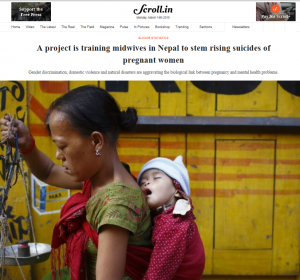
BU welcomed Sam Gyimah MP on Thursday as part of his #SamOnCampus tour. Wearing his Science, Research and Innovation hat, we started with a whistle-stop tour of some interesting projects with a focus on technology and priorities for the Department of Business, Energy and Industrial Strategy. The Minister was keen to be hands on simulator for knee operations with Dr Tom Wainwright from the Orthopaedic Research Institute, and tried out the eye tracking technology with Dr Sarah Bate from the Centre for Face Processing Disorders. He also discussed virtual reality and wayfinding in care homes with Professor Jan Wiener, the AfterGlow project with Vicky Isley and Paul Smith and discussed technological innovations in learning with Professor Elizabeth Falconer. The Minister then heard about BU from Professor John Vinney and Jim Andrews, and was interviewed by two of our BA Multimedia Journalism students. He then helped to break the ground for our Poole Gateway Building.
The main event was the #SamOnCampus event – billed as a dialogue between Sam and students and staff. The event was hosted by Alex Hancox, SUBU VP education with a welcome from the VC, Professor John Vinney and Daniel Asaya, President of SUBU. The Minster, who has called himself the “Minister for Students” and who started by saying that the HE sector has changed and that it is time for students to have a voice, was keen to discuss a wide range of issues, and as well as questions about higher education and fees and funding, a wide range of issues did indeed come up. It would probably fair to say that the Minister supported the government line on these issues (ie. austerity is not a belief system, it’s a necessity and homelessness is a priority issue that needs to be addressed). NB local MP Conor Burns later issued a call to action on homelessness locally so it will be interesting to see where this goes).
The Minister asked the audience several questions, including what their priorities would be if they had his job. He also stayed for some time afterwards chatting to students.
The Minister gave the impression of genuinely wanting to hear what students had to say and was keen to engage and respond, not afraid to give potentially unpopular responses – but he did not have answers to all the questions and did not engage in detail on some of the issues that are important to students – e.g. mental health. It will be interesting to see if there is any follow up on these issues and what the Minister takes away from his tour overall.
On Monday last week the Department for Education announced a 10 week consultation on the subject level TEF – see the press release. The Times Higher published an article.
Consultation questions include:
We’ll be preparing a response to this so please contact policy@bournemouth.ac.uk if you would like to be involved.
In a related announcement, the Minister will also launch an Open Data competition, the first of its kind in the UK HE sector, which will use selected government data on universities so that tech companies and coders can create apps to help prospective students decide where to apply. This competition will build on the government’s recently published Longitudinal Education Outcomes (LEO) dataset, which gives information on employment and salaries after graduation. By democratising access to information about courses and their outcomes, it will help all applicants, regardless of their background, make better decisions and get better value for money. The Universities Minister added:
Timely for the HE review, a report from Million Plus on “Forgotten Learners: Building a system that works for Mature students”. Recommendations are that:
The Government should:
The OfS should:
Universities should:
Research Professional had an article on the UK being frozen out from EU agencies and research post Brexit. The EU has apparently said that participation in things such as the European Medicines Agency is “cherry picking” and unacceptable – will they take the same view on Erasmus? There are separate guidelines on research frameworks which say that the UK would be treated as a third country, can only take part if we make a net contribution and give up decision making powers. The UK currently benefits, taking 40% more out than it puts in, so that looks unhelpful too as an approach.
Please find below initial headlines from today’s Spring Statement, the following links provide a good overview:
After reflecting on the growth and public finance projections, the Chancellor said at the Autumn Budget he would set a path for spending from 2020, with a Spending Review taking place in 2019. He indicated that if in the Autumn the public finances continued to reflect improvements, the Treasury would be able to increase public spending.
Other announcements included:
The Office for Fair Access (OFFA) has published an impact review by Nursaw Associates which has found that “our approach to research and evidence has been successful in helping higher education providers to improve access to and participation in higher education by working in more effective ways”. The document can be found on the OFFA website.
Taking an evidence-led approach to access and participation- “You cannot regulate if you do not understand.” – Academic interviewee In September 2017, we commissioned Nursaw Associates to carry out an impact review of how far the activities of our Evidence and Effective Practice function have successfully met the objective of our Evidence Strategy to support and challenge the sector to continually improve outcomes through the generation of and learning from robust evaluation, research and analysis.
This impact review has demonstrated that:
Why did we do this? – Our 2015-2020 Strategic Plan called for universities and colleges to take an increasingly evidence-led approach to improving performance on access and participation across the whole student lifecycle – from entry right through to the transition to work or further study. Alongside this challenge to institutions, we have also been developing a more evidence-led approach to our own policy and practice. This impact review forms part of our commitment to more intelligent regulation, and was intended to:
What did we find?
Support and challenge – In the minds of institutions, there is significant interdependence between OFFA’s evidence and effective practice work and its regulatory function, with 81 per cent of survey respondents considering that OFFA’s role should be to both regulate higher education and support the sector in its efforts to widen participation.
The value of research to institutions – Survey and interview responses highlighted that OFFA’s research and evaluation work is valued by institutions in terms of:
Widening participation staff felt that OFFA enabled them to influence leaders to understand the importance of their work, and would like OFFA to be more visible in the practitioner community, for example via targeted events and direct communications.
Case study: understanding the impact of financial support – Our research to understand the impact of financial support has led to significant change, with over 57 per cent of institutions from the access agreement analysis using the financial support toolkit developed through this work.
Relationship building – 88 per cent of survey respondents described having a close working relationship with OFFA, which was seen as positive and important for effective regulation. Interviewees from further education colleges (FECs) reported feeling more distant from OFFA, explaining that they don’t consider a close relationship with OFFA to be necessary, but would like opportunities to share and discuss best practice with other FECs.
A sea change – Interviewees reported that OFFA has had a positive impact on the sector, with one describing OFFA creating a “sea change”. This is borne out by access agreement analysis which demonstrates a significant increase in evaluative activity within institutions: only 10 per cent of access agreements in 2013-14 mentioned an evaluation framework, which had risen to 57 per cent in 2018-19. However, interviewees widely acknowledged that evidence and evaluation are not yet embedded into the work of the sector and require further support and intervention from the regulator. Many did not believe that the evaluative work would continue at the same level without the commitment and support from OFFA.
Recommendations – The review has provided valuable learning for OFFA as the current fair access regulator, which we hope will be developed by the OfS as the incoming regulator. We encourage the OfS to:
We hope that institutions will:
To subscribe to the weekly policy update simply email policy@bournemouth.ac.uk
JANE FORSTER | SARAH CARTER
Policy Advisor Policy & Public Affairs Officer
Follow: @PolicyBU on Twitter | policy@bournemouth.ac.uk
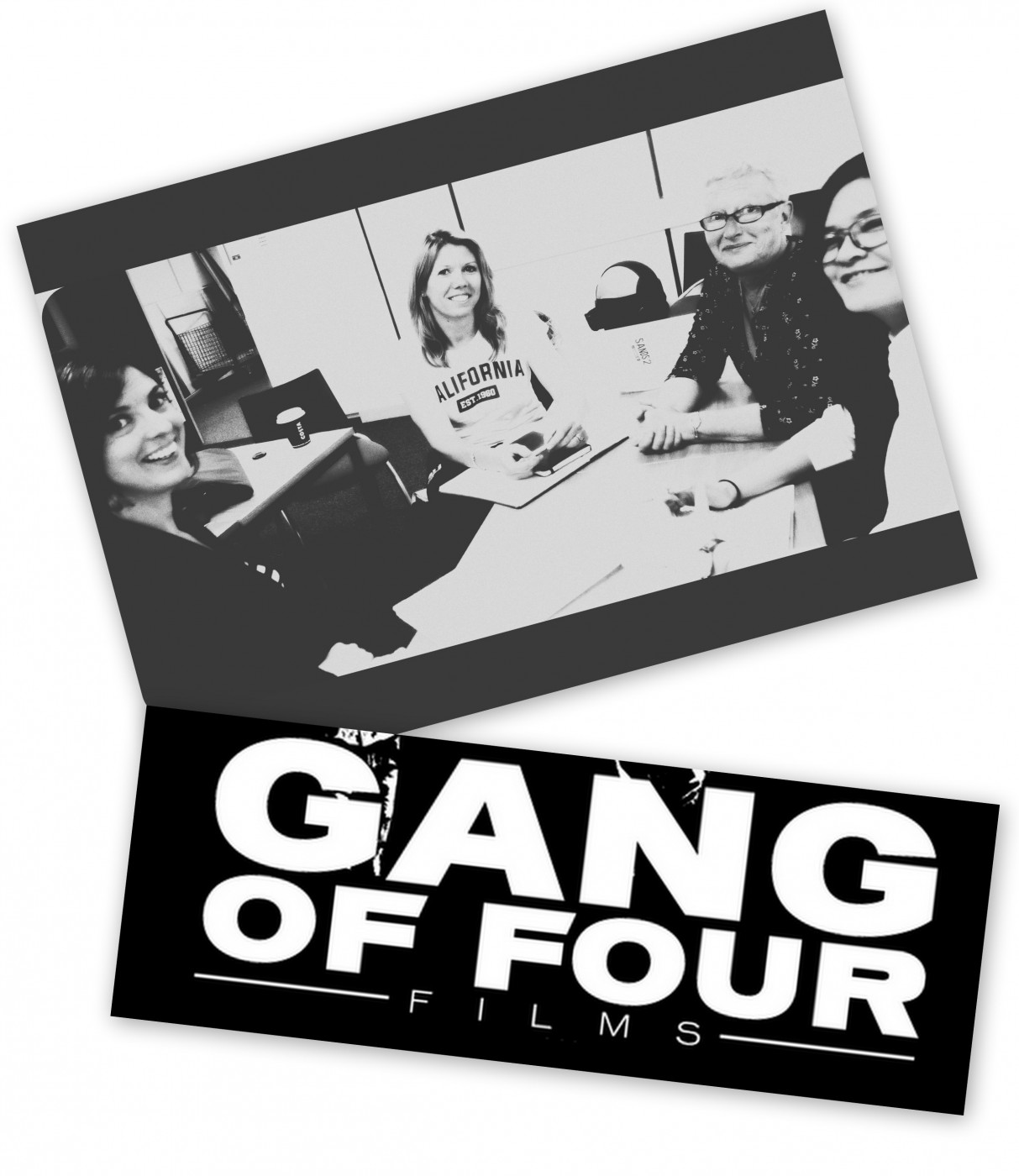

We are running an exciting Speed Collaboration session on Thursday 22 March, starting at 11.30 and including a networking lunch. It is part of a stimulating Interdisciplinary Research Week program starting next week.
Comments about Speed collaboration/networking events from all over the world:
“It was kind of fun, it was kind of light, it wasn’t highly pressured… It was just ‘Lets see if we can make a connection and then take it further if we need to’.”
“What appealed to me about speed networking was the opportunity to meet a lot of people within a short space of time.”
On 31 January 2018, I attended a Speed networking event run by Innovate UK in London to see what the fuss is all about. They have gone for the structure where there are 5 Challenge 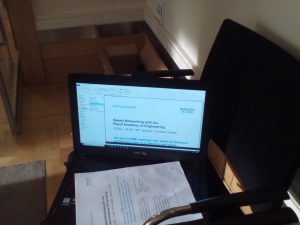 Proposers – Siemens, Deloitte, European Space Agency, Jaguar Land Rover and Reed Smith. The Proposers list their challenges and organisations (about 30 reps attended) apply to pitch their ideas to each Proposer. The Proposers are set up in 5 tables and each organisation is given 5 minutes to present. The Hostess rings a bell and they have to move on to the next Proposer.
Proposers – Siemens, Deloitte, European Space Agency, Jaguar Land Rover and Reed Smith. The Proposers list their challenges and organisations (about 30 reps attended) apply to pitch their ideas to each Proposer. The Proposers are set up in 5 tables and each organisation is given 5 minutes to present. The Hostess rings a bell and they have to move on to the next Proposer.
There was fantastic energy and buzz floating around; and I can feel that definite connections were made. Attend our RKEO Speed Collaboration event and you will find out for yourself how we will be running it and what you can take away from it.
You have to be in it, to win it! A last comment to leave you with:
“It’s a research project that may never have come together, or at least come together as quickly, if it hadn’t been for the speed-networking event. The bottom line is, if you don’t meet people, you will never find someone who can find you new information and a new vision. Breakthroughs can only happen if you acknowledge you don’t know everything.”
All you have to do to book your place is to click here and see what happens next!
 Closing date: 16:00 on 4 April 2018
Closing date: 16:00 on 4 April 2018
NERC invites applications to join a scoping group that will develop the science case for a potential large strategic research programme on Earth system plastics.
The overarching aim is to provide an understanding of the pathways and fate of plastics in the environment.
Potential research questions include:
The SPA will support research on pathways and fate of a range of plastic types, shapes and sizes to gain a comprehensive picture of the behaviour of plastics in the environment to ensure that effective interventions are developed.
Applications are invited from individuals wishing to join the scoping group that will develop the science case for consideration by NERC.
Please click here for further details on the background, details of the scoping group meeting, and how to apply via their online registration form by 16:00 4 April 2018.
 On Thursday BU will host Sam Gyimah, the Minister for Higher Education, Science, Research and Innovation, for a question and answer event. This is an amazing opportunity for students and staff to directly question the Minister on HE and wider political matters.
On Thursday BU will host Sam Gyimah, the Minister for Higher Education, Science, Research and Innovation, for a question and answer event. This is an amazing opportunity for students and staff to directly question the Minister on HE and wider political matters.
This event forms part of Sam’s tour to a handful of universities. Entry to the event is by (free) ticket only. At the time of blogging approximately 50 tickets were still available.
Click here to book your ticket and for more details go to.
The event is being held in KG01 on the Talbot Campus on Thursday 15 March from 17:45-19:30.
Nibbles and refreshments will be available at the end of the event.
Tweeting and sharing on social media is encouraged!
#SamOnCampus